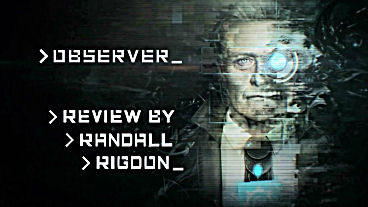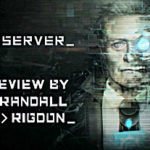
Observer Review
Observer is currently the closest, most-realized cyberpunk adventure game I’ve played since the original 1997 Blade Runner, and its a game I will certainly return to again







Genre: Cyberpunk Horror
Release date: August 15, 2017
Unfortunately – or maybe rather fortunately – Blade Runner: 2046 is set to hit theaters this weekend, and there won’t be a fully-fledged movie game tie-in to correspond with its release.
Thankfully, we have Bloober Team’s well-timed, sleeper-hit Observer, which is the most fully-realized Blade Runner-inspired dystopian cyberpunk gaming experience I think I’ve ever played.
In slick, stunning and even shocking fashion, Observer is a painstaking modernization of everything that made Westwood’s 1997 Blade Runner an adventure game classic, and one of my all-time favorites. At the same time, it encapsulates what made the original film so transformative, perfectly capturing a cyberpunk atmosphere that reveals the most thrilling, stirring and sometimes deeply disturbing tendencies of a sci-fi universe gone astray.
The intro starts in true Blade Runner fashion: We start on a black screen and a slowly-scrolling block of text that reveals the backstory of the setting. However, unlike the original film, the text is narrated by the protagonist Daniel Lazarsk, who is voiced with a very competent, wise, aged tone by veteran actor Rutger Hauer, also famously known from Blade Runner as Roy Batty.
It is 2084 and cybergenetic modifications on the human body have become a popular fare with the population. A digital plague, however, has recently wiped out thousands of lives of the cyber-enhanced, resulting in raised tensions, war and devastation across society.
The player assumes the role of adept detective Daniel Lazarsk, who uses his genetic modifications to his advantage. For instance, he can scan environments with his augmented vision and has the ability to hack into minds (hence being an “observer”).
The game begins in a first-person hovercraft vehicle — almost exactly resembling the Blade Runner spinner — with Daniel receiving information on his in-vehicle monitor from his agency about the details of yet another investigation. My first thought was the game was going to fairly precise replicate of Blade Runner with another-day-in-the-life detective story.
However, Observer quickly shifts away from this notion when Daniel experiences a interruption in his monitor signal and receives a message from his long-lost son. Immediately, Daniel traces the call to a downtown apartment complex and races to the location. The game takes place nearly entirely in this apartment complex, and in almost Maniac Mansion/Day of the Tentacle–fashion, the game makes incredible use of the single location, with lots of nooks and crannies and little secrets to find, making the environment feel like a never-ending convolution of dimly-lit hallways and hidden crevices.
Right off the bat, arriving in this apartment complex displays an eye-opening spectacle of computerized decorating, with shining fragments of augmented digital artifacts bleeding into a real-world contrast of crumbling architecture that brims desolation, loneliness and despair.
Painted throughout the surroundings are bright glowing colors that emit subtle neon hums, with a familiar distant raininess permanently washing across the concrete palette. All the while, the peacefully moody composition of Arkadius Reikowski’s soundtrack stirs a droning atmosphere of foreboding mystery and futuristic eeriness against the meticulously created backdrops.
Observer is much akin to this year’s Resident Evil 7 in that they are both exercises in skillfully choreographed pacing. Every so often I simply let the game sit on a hallway or a room and let it play out continuously, as every corner of the environment has distinct and soothing eye candy that varies frequently. Early-on, I did this with an interestingly lit corridor and watched with wonder as the walls would slowly breathe as if they were alive over time and the music would pulsate in a deep resonance in rhythm with the captivating animation.
Also akin to Resident Evil 7 is that Observer at its core is a first-person adventure game but is also prominently a horror title, so you should expect a fare amount of smartly staged scares. I found most of the scares to be very cleverly executed, oftentimes upstaging some of the most memorable and creative moments of RE7. I would say though that this game isn’t so much terrifying as it is twisted and perturbing — it is mostly a relaxing, tranquil, evenly-paced experience with a scare here and there thrown in for needed variation.
Early on, you’ll come across a murder scene in an apartment. Immediately after the entire complex enters into a complete lockdown, the power is disrupted and residents cannot leave their homes.
This is where a gameplay element unveils itself and truly allows the narrative to shine, letting the player go door-to-door and interrogate apartment residents. This is accomplished through video monitor systems on their doors, each of which display only enlarged images of the residents’ eyeballs peering through the other side. I found this to be a wonderfully striking image.
What’s great is that every door interrogation resembles a little sci-fi mini-story in itself. Characters are introduced whom we never see. We do discover the characters’ backstories and discover the predicaments of their modern lives. They’re typically suffering from the downfalls of recognizable sci-fi tropes and innate technological human fears.
For instance, in one situation the character doesn’t know who he is anymore because of the blurring of his waking reality and his VR realities, his VR being disconnected due to the power outage. Another character is terrified of an all-watching, omniscient being; a seemingly supernatural moment. This turns out to be the product of the resident’s paranoia about the hidden security technologies a former acquaintance may have set up in the apartment.
I really love these sequences because they do a compelling job of relaying the lore and realities of this world without ever revealing the characters’ faces or the tangible environments that exist behind these perpetually-closed doors. They present full stories with twists that are executed purely through dialogue, almost playing out like an old-time radio show, fully taking advantage of what you can’t see and relaying an intense feeling of what-lays-on-the-other-side mystery and suspense.
While exploring the grimy, exposed-wire-entangled scenes of the dilapidated apartments, the player can, on the fly, switch between two augmented visual filters that highlight and unveil details and objects to interact with in the environment. The very effect of executing these filters on and off is a visually satisfying affair, rendering the environment in different aesthetically-pleasing view-modes while allowing the player to solve the mysteries and puzzles with cursive ease.
Also, once in the crime scenes, Daniel can “mind-hack” the minds of the dead to relive their memories and get a sense of their backstories leading up to their deaths. This is really where the action, the story, and variety of Observer unfolds.
In these flashback sequences, reality is fragile and blends between Daniel’s world and the victim’s world in an abstract, sporadic and disconnected presentation. Visually, the game throws every single change-up and unexpected idea it can during these scenes, including a few fourth-wall breaking tricks that truly surprised me and that I can easily admit I have never seen before.
These flashback sequences are really the highlight of the game. In them, the Blooper team takes the opportunity to go any which way, and takes the first-person storytelling medium to the fullest of its potentials.
Being that these sequences are abstract and unpredictable, this is also where the game reaches some of its scariest moments. There are a few sequences that break the game away from its adventure game core in order to resemble an escape-from-the-monster game (à la Outlast), but ultimately all of these sequences mostly rely on stealth rather than running away, as usually, the enemy can be easily navigated around without any detection at all.
Eventually, Daniel’s waking reality begins to deteriorate as well, and this is where a lot of the horror of the game really settles. Daniel’s consciousness is easily manipulated by digital interference and this leads into the idea that nothing you see can be trusted. Determining what’s real, what has significance and who’s pulling the strings all tie into the thick sense of tension that Bloober Team has expertly created; where the horror isn’t solely a direct-threat-to-mortality horror, but more of a what-can-really-be-trusted-in-this-world horror.
Eventually, though, things start to make strong cohesive sense narrative-wise as Observer comes to a close. I found the twist at the end to actually be really smart. Ultimately, Observer settles into a very unique and very original murder mystery tale that could only be delivered through a sci-fi framework that incorporates ideas of eternal consciousness, man vs machine, eastern philosophy, and corporate conspiracy.
What I really like is the game stuck hard to its science-fiction roots in its final explanations. What I initially thought was a story filled with supernatural and fanatical themes all ended up having very mechanical, scientific explanations. In my mind, having grounded, plausible, science-based twists to the more abstract elements of a science-fiction story is imperative to do the genre right, and it is not often executed this thoroughly and tenaciously in a video game of this sort.
Overall, Observer is a must-play for science-fiction adventure game fans. When I really think about it, Observer executes everything great from adventure games and the science fiction genre, and even offers plenty of hidden secret touches to keep the game interesting and exciting around the edges. In my opinion, outside of Westwood’s original Blade Runner adaptation, I don’t think there’s ever been a stronger execution of cyberpunk in an adventure game to date.
Observer exemplifies why cyberpunk and adventure games are a match made in heaven. When you explore a mood-drenched environment with gorgeous droning music dripping around you while uncovering a subtle mystery with the openness to reflect on the underlying themes of Eastern philosophy and technological discourse, you truly have a special formula that has to be experienced to be really felt. Observer is currently the closest, most-realized cyberpunk adventure game I’ve played since the original 1997 Blade Runner, and its a game I will certainly return to again.
|
+ Beautifully-captured cyberpunk atmosphere
+ Flawlessly-paced first-person adventuring that will appeal to horror and non-horror fans alike
– Some stealth sequences may not appeal to adventure game fans
|
 |

Leave a Reply